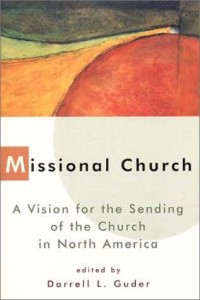Why the Missional Church Needs Theology
 Over the past few months I have spent a lot of time reading about the missional church. All of this reading and studying is part of my plan (and my wife's earnest plea) for me to finish my work at Wesley Theological Seminary in a few months. Most recently I have been reading Missional Church, edited by Darrell Guder. One thing that has really stuck out to me is why missional communities, that is to say missional churches NEED to have at the very least a basic understanding of missional theology.
One characteristic of the missional church that has really stood out to me this week is that in the missional church's theology and practice it is adaptive, innovative, and creative instead of being resistant to innovation and change. In order to be adaptive and innovative in the community it is serving, the missional church must look at the context in which it is working.
Over the past few months I have spent a lot of time reading about the missional church. All of this reading and studying is part of my plan (and my wife's earnest plea) for me to finish my work at Wesley Theological Seminary in a few months. Most recently I have been reading Missional Church, edited by Darrell Guder. One thing that has really stuck out to me is why missional communities, that is to say missional churches NEED to have at the very least a basic understanding of missional theology.
One characteristic of the missional church that has really stood out to me this week is that in the missional church's theology and practice it is adaptive, innovative, and creative instead of being resistant to innovation and change. In order to be adaptive and innovative in the community it is serving, the missional church must look at the context in which it is working.
Missional communities can only effective operate when they operate within the context of their particular community. Not the community of an author or another missional community. It must operate within the context of the neighborhood, the street, or even the block in which it serves. No common program or agenda will work in every community. No particular way of sharing the Gospel will work in everyone community. And there is no "right" way to engage in the work of the missional church.
At it's very core, the missional church is being led by the Holy Spirit.
You know, the Holy Spirit. The third-wheel of the Trinity that is often ignored or forgotten about by. Being guided by the Holy Spirit, the missional church (and the church in general) has the ability to not just present a more caring or loving way of life but also a completely alternative outlook to the way in which we all live in community with one another. The missional church has the ability to move neighbors beyond saying a disingenuous hello when taking the trash out. Neighbors can begin to not only live next to one another but they cal also live with and care for one another.
Throughout the New Testament we read about sacrificial living, mutual love and support, and holiness. All of these things have a place and are essential to the missional church. Sacrificial living puts your needs and the needs of the entire community over mine. Mutual love and support places me into relationship with you. Caring for one another not because it's just a nice thing to do but because it is the Holy Spirit which leads us and it is our brotherhood created by Christ that is at the center of our relationship. And both of these things are done with the knowledge we can only grow in our relationship to Christ and towards Christian perfection if we seek holiness together.
The missional church and missional theology is not the seeking of salvation on our own for ourselves. Rather it is a mutual love and affection, connected through Christ, which leads us towards not only a great relationship with our Creator but also towards the fulfillment of God's reign here on earth.
Without a basic understanding of why the missional church does what it is doing the church has the potential to be reduced to a group of good people doing good work in the community instead of a church promoting "compassion, justice, and peace" (Guder, pg. 142). And doing good works as good people is not wrong at all. That is what many churches are doing today. They go out into the community to do something nice and then retreat to the safety of their social halls and classrooms.
The missional church is different. When led by the Spirit, it has the ability to not only enact great change in the community but at the same time proclaim the Gospel in such a way that compassion, justice, and peace become a natural goal in everything the community does.